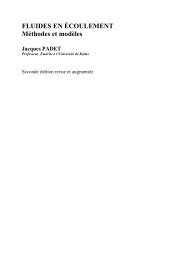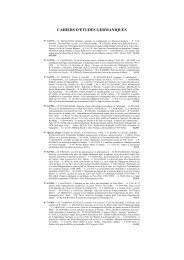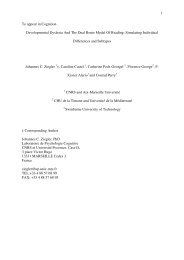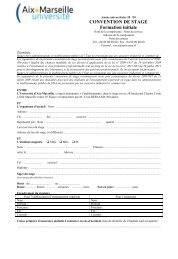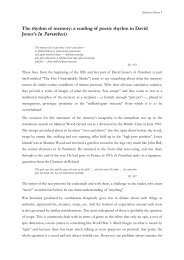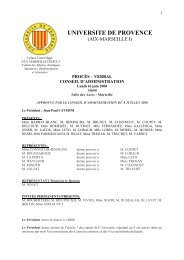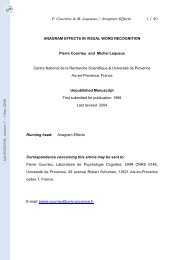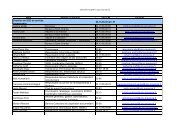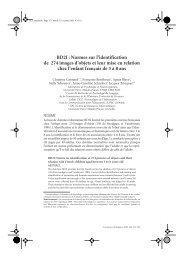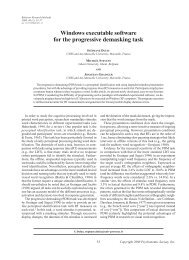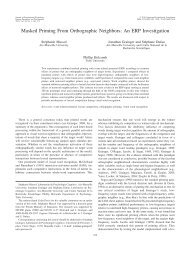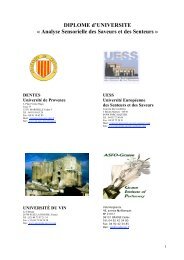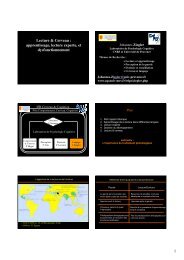198BibliographieSeid<strong>en</strong>berg, M. S., Waters, G. S., Barnes, M. A., & Tan<strong>en</strong>haus, M. K. (1984). Wh<strong>en</strong> does irregular spellingor pronunciation influ<strong>en</strong>ce word recognition? Journal of Verbal Learning and Verbal Behavior, 23,383-404.Sejnowski, T. J., & Ros<strong>en</strong>berg, C. R. (1986). Nettalk : A parallel network that learns to read aloud (EE andCS Techn. Rep. No. JHU/EECS-86/01). Baltimore, MD : Johns Hopkins University.Selkirk, E. O. (1982). The syllable. In H. Van der Hulst and N. Smith (Eds.), The structure of phonologicalrepres<strong>en</strong>tations (Part II). Dortrecht, Holland : Foris.Ser<strong>en</strong>o, J. A. (1991). Graphemic, associative, and syntactic priming effects at a brief stimulus onset asynchronyin lexical decision and naming. Journal of Experim<strong>en</strong>tal Psychology : Learning, Memory andCognition, 17, 459-477.Ser<strong>en</strong>o, J. A., & Jongman, A. (1997). Processing of English inflectional morphology. Memory & Cognition,25, 425-437.Shallice, T., & McCarthy, R. (1985). Phonological reading : From patterns of impairm<strong>en</strong>t to possible proce<strong>du</strong>res.In K. Patterson, J.C. Marshall, & M. Coltheart (Eds.), Surface dyslexia : Neuropsychologicaland cognitive studies of phonological reading. Hillsdale, NJ : Erlbaum.Shallice, T., Warrington, E. K., & McCarthy, R. (1983). Reading without semantics. Quarterly Journal ofExperim<strong>en</strong>tal Psychology, 35A, 111-138.Shannon, C. A. (1951). Prediction and <strong>en</strong>tropy of printed English. Bell System Technical Journal, 30, 50-64.Shimron, J., & Navon, D. (1981). The distribution of information within letters. Perception & Psychophysics,30, 483-491.Smith, F. (1971). Understanding reading : A psycholinguistic analysis of reading and learning to read. NewYork : Holt, Rinehart & Winston.Smol<strong>en</strong>sky, P. (1988). On the proper treatm<strong>en</strong>t of connectionism. Behavioral and Brain Sci<strong>en</strong>ces, 11, 1-22.Snodgrass, J. G. & Mintzer, M. (1993). Neighborhood effects in visual word recognition : Facilitatory orinhibitory? Memory and Cognition, 21, 247-266.Snodgrass, J. G., & Poster, M. (1992). Visual-word recognition thresholds for scre<strong>en</strong>-fragm<strong>en</strong>ted names ofthe Snodgrass and Vanderwart pictures. Behavior Research Methods, Instrum<strong>en</strong>ts, & Computers, 24,1-15.Sperling, G. (1967). Successive approximations to a model for short-term memory. Acta Psychologica, 27,285-292.Spieler, D.H., & Balota, D. A. (1997). Bringing computational models of word naming down to the itemlevel. Psychological Sci<strong>en</strong>ce, 8, 411-416.Spoehr, K. T., & Smith, E. E. (1973). The role of syllables in perceptual processing. Cognitive Psychology,5, 71-89.Srinivas, K., Roediger, H. L., & Rajaram, S. (1992). The role of syllabic and orthographic properties ofletter cues in solving word fragm<strong>en</strong>ts. Memory and Cognition, 20, 219-230.Stanhope, N., & Parkin, A. J. (1987). Further explorations of the consist<strong>en</strong>cy effect in word and nonwordpronunciation. Memory and Cognition, 15, 169-179.Stanovich, K. E. (1986). Matthew effects in reading : Some consequ<strong>en</strong>ces of indivi<strong>du</strong>al differ<strong>en</strong>ces in theacquisition of literacy. Reading Research Quarterly, XXI, 4, 360-406.Stanovich, K. E. (1987). Perspectives on segm<strong>en</strong>tal analysis and alphabetic literacy. Cahiers de PsychologieCognitive / European Bulletin of Cognitive Psychology, 7, 5, 514-519.Stanovich, K. E. (1988). Explaining the differ<strong>en</strong>ces betwe<strong>en</strong> the dyslexic and the gard<strong>en</strong>-variety poor reader :The phonological-core variable differ<strong>en</strong>ce model. Journal of Learning Disabilities, 22, 590-612.
Bibliographie 199Stanovich, K. E., & Bauer, D. W. (1978). Experim<strong>en</strong>ts on the regularity effect. Memory & Cognition, 6,410-415.Stone, G. O., Vanhoy, M. D., & Van Ord<strong>en</strong>, G. C. (1997). Perception is a two-way street : Feedforward andfeedback phonology. Journal of Memory and Language, 36, 337-359.Stone, G. O., & Van Ord<strong>en</strong>, G. C. (1993). Strategic control of processing in word recognition. Journal ofExperim<strong>en</strong>tal Psychology : Human Perception and Performance, 19, 744-774.Taft, M. (1979). Lexical access via an orthographic code : The basic orthographic syllabic structure (BOSS).Journal of Verbal Learning and Verbal Behavior, 18, 21-39.Taft, M. (1982). An alternative to grapheme-phoneme conversion rules ? Memory & Cognition, 10, 465-474.Taft, M., & Forster, K. I. (1976). Lexical storage and the retrieval of polymorphemic and polysyllabic words.Journal of Verbal Learning and Verbal Behavior, 15, 607-620.Tallal, P. (1980). Auditory temporal perception, phonics, and reading disabilities in childr<strong>en</strong>. Brain & Language,9, 182-198.Tallal, P., Miller, S. L., Bedi, G., Byma, G., Wang, X., Nagarajan, S. S., Schreiner, C., J<strong>en</strong>kins, W. M., &Merz<strong>en</strong>ich, M. M. (1996). Language compreh<strong>en</strong>sion in language-learning impaired childr<strong>en</strong> improvedwith acoustically modified speech. Sci<strong>en</strong>ce, 271, 81-83.Taraban, R., & McClelland, J. L. (1987). Conspiracy effects in word pronunciation. Journal of Memory andLanguage, 26, 608-631.Thorndike, E. L., & Lorge, I. (1944). The teacher’s word book of 30,000 words. New York : Teachers Col.Bur. Publ., Columbia University.Towns<strong>en</strong>d, J. T. (1971). Theoretical analysis of an alphabetic confusion matrix. Perception & Psychophysics,9, 40-50.Towns<strong>en</strong>d, J. T., & Ashby, F. G. (1983). The stochastic modeling of elem<strong>en</strong>tary psychological process.Cambridge, England : Cambridge University Press.Towns<strong>en</strong>d, J. T., & Ashby, F. G. (1984). Measurem<strong>en</strong>t scales and statistics : The misconception misconceived.Psychological Bulletin, 96, 394-401.Towns<strong>en</strong>d, J. T., Taylor, S. G., & Brown, D. R. (1971). Lateral masking for letters with unlimited viewingtime. Perception & Psychophysics, 10, 375-378.Treiman, R. (1989). The internal structure of the syllable. In : G. Carlson & M. Tan<strong>en</strong>haus (Eds.), Linguisticstructure in language processing. Dordrecht, The Netherlands : Kluwer.Treiman, R. (1994). To what ext<strong>en</strong>t do orthographic units in print mirror phonological units in speech ?Journal of Psycholinguistic Research, 23, 91-110.Treiman, R., & Chafetz, J. (1987). Are there onset- and rime- like units in writt<strong>en</strong> words ? In : M. Coltheart(Ed.), Att<strong>en</strong>tion & Performance XII. London : Erlbaum.Treiman, R., Goswami, U., & Bruck, M. (1990). Not all words are alike : Implications for reading developm<strong>en</strong>tand theory. Memory and Cognition 18, 559-567.Treiman, R., Mull<strong>en</strong>nix, J., Bijeljac-Babic, R., & Richmond-Welty, E. D. (1995). The special role of rimesin the <strong>des</strong>cription, use, and acquisition of English orthography, Journal of Experim<strong>en</strong>tal Psychology :G<strong>en</strong>eral, 124, 107-136.Treiman, R., & Zukowski, A. (1988). Units in reading and spelling. Journal of Memory and Language 27,466-477.Treiman, R., & Zukowski, A. (1990). Toward an understanding of English syllabification. Journal of Memoryand Language, 29, 66-85.
- Page 1:
UNIVERSITÉ DE PROVENCE, AIX-MARSEI
- Page 4 and 5:
Ce travail clôt un cycle de format
- Page 6 and 7:
CHAPITRE 7 : LE FUM . . . . . . . .
- Page 8 and 9:
8IntroductionPour cela, notre domai
- Page 10 and 11:
10Introduction• au niveau lexical
- Page 12 and 13:
12Introduction• sa forme visuelle
- Page 14 and 15:
14IntroductionAprès avoir posé le
- Page 16 and 17:
16Méthodologiespulations sur les i
- Page 18 and 19:
18Méthodologies2.1. Protocoles exp
- Page 20 and 21:
20Méthodologiessi le stimulus se t
- Page 22 and 23:
22MéthodologiesCertaines études t
- Page 24 and 25:
24Méthodologiestes, on obtient des
- Page 26 and 27:
26Méthodologies1996 ; Peter & Turv
- Page 28 and 29:
28Méthodologiesles performances da
- Page 30 and 31:
30Méthodologies6 %8%10%15%30%50%80
- Page 32 and 33:
32MéthodologiesMatériel expérime
- Page 34 and 35:
34Méthodologiesentraîne le masqua
- Page 36 and 37:
36MéthodologiesLe même résultat
- Page 38 and 39:
38Méthodologies120100Situation Sta
- Page 40 and 41:
Chapitre 3Orthographe et phonologie
- Page 42 and 43:
42Orthographe et Phonologie3.1. Var
- Page 44 and 45:
44Orthographe et PhonologieLa Figur
- Page 46 and 47:
46Orthographe et PhonologieJacobs,
- Page 48 and 49:
48Orthographe et Phonologiedans la
- Page 50 and 51:
50Orthographe et PhonologieDans l
- Page 52 and 53:
52Orthographe et Phonologieteurs du
- Page 54 and 55:
54Orthographe et PhonologieGoldstei
- Page 56 and 57:
56Orthographe et Phonologietion est
- Page 58 and 59:
58Orthographe et Phonologierand, 19
- Page 60 and 61:
60Orthographe et Phonologieplus ad
- Page 62 and 63:
62Orthographe et Phonologie3.2.3.1.
- Page 64 and 65:
64Orthographe et PhonologiePlus ré
- Page 66 and 67:
66Orthographe et PhonologieUne autr
- Page 68 and 69:
68Orthographe et Phonologiedeux var
- Page 70 and 71:
Chapitre 4Modèles de la perception
- Page 72 and 73:
72Modèles de la perception visuell
- Page 74 and 75:
74Modèles de la perception visuell
- Page 76 and 77:
76Modèles de la perception visuell
- Page 78 and 79:
78Modèles de la perception visuell
- Page 80 and 81:
80Modèles de la perception visuell
- Page 82 and 83:
82Modèles de la perception visuell
- Page 84 and 85:
84Modèles de la perception visuell
- Page 86 and 87:
86Modèles de la perception visuell
- Page 88 and 89:
88Modèles de la perception visuell
- Page 90 and 91:
90Modèles de la perception visuell
- Page 92 and 93:
92Modèles de la perception visuell
- Page 94 and 95:
94Modèles de la perception visuell
- Page 96 and 97:
96Modèles de la perception visuell
- Page 98 and 99:
98MROM-pspécifier leur lien avec l
- Page 100 and 101:
100MROM-pphonèmes reliés par un r
- Page 102 and 103:
102MROM-pLorsque le modèle génèr
- Page 104 and 105:
104MROM-pque ce système artificiel
- Page 106 and 107:
106Unités de la lecturelinguistiqu
- Page 108 and 109:
108Unités de la lecture22606TR (ms
- Page 110 and 111:
110Unités de la lecturemes. Aussi
- Page 112 and 113:
112Unités de la lecturephonologiqu
- Page 114 and 115:
114Unités de la lectureelle-même
- Page 116 and 117:
116Unités de la lecture6.3. Expér
- Page 118 and 119:
118Unités de la lectureRead est qu
- Page 120 and 121:
120Unités de la lectureces modèle
- Page 122 and 123:
122Unités de la lecturechapitre su
- Page 124 and 125:
124FUMmultiples existant au sein de
- Page 126 and 127:
126FUMpar Berndt, Lynne D'Autrechy
- Page 128 and 129:
128FUMcessus de compétition et du
- Page 130 and 131:
130FUMgène et suit les principes c
- Page 132 and 133:
132FUMPseudohomophonesContrôles Or
- Page 134 and 135:
134FUM61023TR (ms) Seidenberg et al
- Page 136 and 137:
136FUMportementaux et les résultat
- Page 138 and 139:
138FUMà une entité extérieure au
- Page 140 and 141:
Chapitre 8Des prédictionsau niveau
- Page 142 and 143:
142Des prédictions au niveau des m
- Page 144 and 145:
144Des prédictions au niveau des m
- Page 146 and 147:
146Des prédictions au niveau des m
- Page 148 and 149: 148Des prédictions au niveau des m
- Page 150 and 151: 150Des prédictions au niveau des m
- Page 152 and 153: 152Des prédictions au niveau des m
- Page 154 and 155: 154Des prédictions au niveau des m
- Page 156 and 157: 156Des prédictions au niveau des m
- Page 158 and 159: 158Des prédictions au niveau des m
- Page 160 and 161: 160Des prédictions au niveau des m
- Page 162 and 163: 162Des prédictions au niveau des m
- Page 164 and 165: 164Des prédictions au niveau des m
- Page 166 and 167: 166Les mots polysyllabiquesmots mon
- Page 168 and 169: 168Les mots polysyllabiquesTableau
- Page 170 and 171: 170Les mots polysyllabiques9.2. Exp
- Page 172 and 173: 172Les mots polysyllabiques19001890
- Page 174 and 175: 174Les mots polysyllabiquesnexe XI
- Page 176 and 177: 176Les mots polysyllabiques9.4. Dis
- Page 178 and 179: 178ConclusionConclusion« La grande
- Page 180 and 181: 180Conclusionplutôt un système o
- Page 182 and 183: 182Conclusiontester les prédiction
- Page 184 and 185: 184BibliographieAderman, D., & Smit
- Page 186 and 187: 186BibliographieBrysbaert, M., Vitu
- Page 188 and 189: 188BibliographieFerrand, L., Segui,
- Page 190 and 191: 190BibliographieGrainger, J., & Jac
- Page 192 and 193: 192BibliographieKay, J., & Bishop,
- Page 194 and 195: 194BibliographieMewhort, D. J. K.,
- Page 196 and 197: 196BibliographiePerea, M., & Pollat
- Page 200 and 201: 200BibliographieTreiman, R., & Zuko
- Page 202 and 203: 202AnnexesAnnexes
- Page 204 and 205: 204AnnexesAnnexe II : Temps de rép
- Page 206 and 207: 206AnnexesAnnexe IV : Temps de rép
- Page 208 and 209: 208Annexesd t 88 3 fixed fI%tdd d 3
- Page 210 and 211: 210Annexesoo u 3395 57 too tuoo $ 5
- Page 212 and 213: 212AnnexesAnnexe VI : Liste des 120
- Page 214 and 215: 214AnnexesAnnexe VII : Détail des
- Page 216 and 217: 216AnnexesSujets Stim. Erreur Sujet
- Page 218 and 219: 218AnnexesSujet Moyenne % Err ES Su
- Page 220 and 221: 220AnnexesAnnexe X : Stimuli employ
- Page 222 and 223: 222AnnexesAnnexe XI : Stimuli emplo
- Page 224 and 225: 224Appendice IMROM-P : An interacti
- Page 226 and 227: 226Appendice Ilanguages (French, Ge
- Page 228 and 229: 228Appendice Isummed frequency of f
- Page 230 and 231: 230Appendice IClearly, the ability
- Page 232 and 233: 232Appendice Ito an orthographic le
- Page 234 and 235: 234Appendice IFigure 6 gives an ill
- Page 236 and 237: 236Appendice Iestimator set study,
- Page 238 and 239: 238Appendice ISTEP 3. CRITERION SET
- Page 240 and 241: 240Appendice Iteractive processes o
- Page 242 and 243: 242Appendice INotwithstanding, a no
- Page 244 and 245: 244Appendice I1994). Our stratagem
- Page 246 and 247: 246Appendice ILass, U. (1995). Einf
- Page 248 and 249:
248Appendice IAPPENDIXA1. Cleaning
- Page 250 and 251:
250Appendice IIA phoneme effect in
- Page 252 and 253:
252Appendice IIAs shown in Table 1,
- Page 254 and 255:
254Appendice IImay depend on their
- Page 256 and 257:
Appendice III
- Page 258 and 259:
258Appendice IIIHowever, an unsolve
- Page 260 and 261:
260Appendice IIIgrapheme compared t
- Page 262 and 263:
262Appendice IIIRead, J. D. (1983).
- Page 264:
264Appendice IIIAppendix AMean resp



